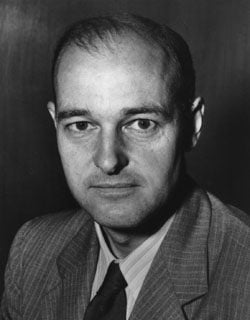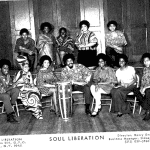I recently reread a text that I already know well, but encountered it once again in a new setting, and the result was an almighty sense of déjà vu. It actually helps us understand what is going on in the wider world.
I last year published a book called A Global History of the Cold War 1945-1991 (Palgrave Macmillan, 2021). Like everyone else writing on that topic, I naturally quoted a key document called the Long Telegram, written by George Kennan in early 1946, which offered brilliant insights into the nature of Soviet thinking, and which did much to shape Western responses to that situation over the following decades. It is beyond argument one of the most important documents of the twentieth century (and all in five thousand words).
When Kennan wrote, Soviet policy was ostensibly guided by Marxist and Leninist ideology. As he pointed out, that mainly proved a guise through which the Russians could pursue their longer term historical and imperial objectives. In light of the recent Russian expansion under Putin, and the overly imperialist and ethno-nationalist tone that he is now adopting, these comments sound daily more relevant.
That “imperial” strand demands emphasis. Among the countless chilling pronouncements coming from Putin recently was his declaration that former Soviet republics needed to remember that they were all components of “historical Russia.” Last year, he even said that the Soviet collapse in 1991 was “a disintegration of historical Russia under the name of the Soviet Union.” That did not get as much attention as it should have done in the West because most non-specialists used to think of “Soviet” and “Russian” as pretty indistinguishable anyway, but in fact it was anything but that. After the fall of the Russian Empire in 1917, the new Soviet Union struggled for decades to avoid or conceal that Russian identity, and to present the face of a multi-national and multi-ethnic reality that was “Soviet.” Lithuanians, Georgians, Ukrainians, Uzbeks, and Armenians were all equally “Soviet,” although of course they were not Russian. It was like the position of Ireland and Scotland within the larger British Empire, with “Britain” being intended as an umbrella term for the separate component nations. Oddly, the Soviets even operated a kind of affirmative action policy for minority peoples and languages. Now along comes Putin with the very, very, radical idea that those former Soviet subjects were and are all Russian, which is rather like telling the Irish that they need to recognize they are all really English. Gee, I wonder how that would work out? What could go wrong?
Whenever Putin says “historical Russia,” as he does frequently, always read “Russian Empire.”
Read the whole Kennan telegram by all means, which still has so much to offer, but here are what I find some key passages. Do especially read the third paragraph here about the incredibly paranoid, neurotic, and self-deceptive methods of Russian policy-making. Feel free to substitute “Putin” for Stalin in what follows. The comments about access to information about the wider world particularly sound as if they could have been written yesterday. And as for an elite “seemingly inaccessible to considerations of reality in its basic reactions” …. well, yes:
At bottom of Kremlin’s neurotic view of world affairs is traditional and instinctive Russian sense of insecurity. Originally, this was insecurity of a peaceful agricultural people trying to live on vast exposed plain in neighborhood of fierce nomadic peoples. To this was added, as Russia came into contact with economically advanced West, fear of more competent, more powerful, more highly organized societies in that area. But this latter type of insecurity was one which afflicted rather Russian rulers than Russian people; for Russian rulers have invariably sensed that their rule was relatively archaic in form fragile and artificial in its psychological foundation, unable to stand comparison or contact with political systems of Western countries. For this reason they have always feared foreign penetration, feared direct contact between Western world and their own, feared what would happen if Russians learned truth about world without or if foreigners learned truth about world within. And they have learned to seek security only in patient but deadly struggle for total destruction of rival power, never in compacts and compromises with it.
It was no coincidence that Marxism, which had smoldered ineffectively for half a century in Western Europe, caught hold and blazed for first time in Russia. Only in this land which had never known a friendly neighbor or indeed any tolerant equilibrium of separate powers, either internal or international, could a doctrine thrive which viewed economic conflicts of society as insoluble by peaceful means. After establishment of Bolshevist regime, Marxist dogma, rendered even more truculent and intolerant by Lenin’s interpretation, became a perfect vehicle for sense of insecurity with which Bolsheviks, even more than previous Russian rulers, were afflicted. In this dogma, with its basic altruism of purpose, they found justification for their instinctive fear of outside world, for the dictatorship without which they did not know how to rule, for cruelties they did not dare not to inflict, for sacrifice they felt bound to demand. In the name of Marxism they sacrificed every single ethical value in their methods and tactics. Today they cannot dispense with it. It is fig leaf of their moral and intellectual respectability. Without it they would stand before history, at best, as only the last of that long succession of cruel and wasteful Russian rulers who have relentlessly forced country on to ever new heights of military power in order to guarantee external security of their internally weak regimes. This is why Soviet purposes most always be solemnly clothed in trappings of Marxism, and why no one should underrate importance of dogma in Soviet affairs. Thus Soviet leaders are driven [by?] necessities of their own past and present position to put forward which [apparent omission] outside world as evil, hostile and menacing, but as bearing within itself germs of creeping disease and destined to be wracked with growing internal convulsions until it is given final Coup de grace by rising power of socialism and yields to new and better world. This thesis provides justification for that increase of military and police power of Russian state, for that isolation of Russian population from outside world, and for that fluid and constant pressure to extend limits of Russian police power which are together the natural and instinctive urges of Russian rulers. Basically this is only the steady advance of uneasy Russian nationalism, a centuries old movement in which conceptions of offense and defense are inextricably confused. But in new guise of international Marxism, with its honeyed promises to a desperate and war torn outside world, it is more dangerous and insidious than ever before.
It should not be thought from above that Soviet party line is necessarily disingenuous and insincere on part of all those who put it forward. Many of them are too ignorant of outside world and mentally too dependent to question [apparent omission] self-hypnotism, and who have no difficulty making themselves believe what they find it comforting and convenient to believe. Finally we have the unsolved mystery as to who, if anyone, in this great land actually receives accurate and unbiased information about outside world. In atmosphere of oriental secretiveness and conspiracy which pervades this Government, possibilities for distorting or poisoning sources and currents of information are infinite. The very disrespect of Russians for objective truth–indeed, their disbelief in its existence–leads them to view all stated facts as instruments for furtherance of one ulterior purpose or another. There is good reason to suspect that this Government is actually a conspiracy within a conspiracy; and I for one am reluctant to believe that Stalin himself receives anything like an objective picture of outside world. Here there is ample scope for the type of subtle intrigue at which Russians are past masters. Inability of foreign governments to place their case squarely before Russian policy makers–extent to which they are delivered up in their relations with Russia to good graces of obscure and unknown advisors whom they never see and cannot influence–this to my mind is most disquieting feature of diplomacy in Moscow, and one which Western statesmen would do well to keep in mind if they would understand nature of difficulties encountered here.
…
In summary, we have here a political force committed fanatically to the belief that with US there can be no permanent modus vivendi that it is desirable and necessary that the internal harmony of our society be disrupted, our traditional way of life be destroyed, the international authority of our state be broken, if Soviet power is to be secure. This political force has complete power of disposition over energies of one of world’s greatest peoples and resources of world’s richest national territory, and is borne along by deep and powerful currents of Russian nationalism. In addition, it has an elaborate and far flung apparatus for exertion of its influence in other countries, an apparatus of amazing flexibility and versatility, managed by people whose experience and skill in underground methods are presumably without parallel in history. Finally, it is seemingly inaccessible to considerations of reality in its basic reactions. For it, the vast fund of objective fact about human society is not, as with us, the measure against which outlook is constantly being tested and re-formed, but a grab bag from which individual items are selected arbitrarily and tendentiously to bolster an outlook already preconceived.
Maybe the Long Telegram is due for a whole rebirth.
I am honestly wondering if, in retrospect, the whole Cold War should have been seen as a simple confrontation with Russian nationalism and imperialism. Perhaps Ronald Reagan was right: not only was the Soviet Union he described in 1983 indeed the Evil Empire, but it always has been, and will continue to be just that. In that case, Communism was just The Grand Distraction. (Discuss!)














